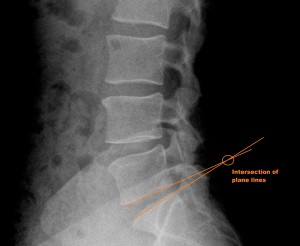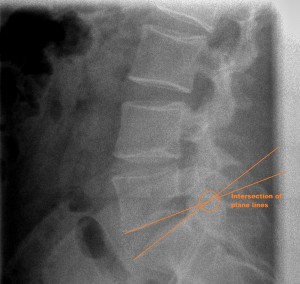Facet Imbrication Can Be A Cause of Sciatica
The lumbar facets allow for movement in the lumbar spine. They are especially involved in rotation. I have written several articles on facet joint problems, most recently Tropism. Today I’d like to illustrate a common problem associated with chronic poor posture; Facet Imbrication.
Facet Imbrication is a chronic posture problem
Facet imbrication occurs when the upper portion of the lumbar spine, and by necessity, the weight of the upper body, is shifted back relative to the pelvis. Imagine standing tall with good posture, then push your shoulders back and your pelvis forward. That coupled motion adds to the weight-bearing load of the lumbar facets. Because the facet imbrication can cause nerve sensitivity, sciatica pain is a common complaint.

Normally, the intersection of the disc plane lines is behind the body. This promotes a healthy weight-load on the facets.
Normally, the facets are able to sustain about 10-15% of the axial compressive load from the upper body. Most of the weight is being borne by the brick-shaped vertebral bodies. The facets act more like rails for a train; guiding and directing movement.

This xray shows facet imbrication. Note how the disc plane lines intersect inside the posterior element.
Sometimes, the facet imbrication can be caused by a single lumbar disc which is excessively wedge-shaped. This can happen when the sacrum is tipped forward or the L5 vertebra is tipped backwards. This type of facet imbrication is difficult to find without x-ray. When your chiropractor is examining your spine without x-ray, he can reliably detect general movement and position sense. But when the L5 tips back and the sacrum tip forward, it is very difficult to detect without x-ray.
Chiropractic treatment for Facet Imbrication
There are special chiropractic adjustment techniques to correct this type of misalignment. In addition to chiropractic manipulation, your skilled chiropractor will have you do certain exercises to strengthen the posture muscles on the front part of the spine. Electrical therapy and ultrasound can be used to reduce soft-tissue involvement.



